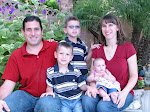It is trendy to espouse confidence in the "love of God." Many of my friends on Facebook opt for this emphasis in the box where one can list their religious views instead of "Christian" or their specific denomination. On the one hand, this seems to me a good emphasis. After all, doesn't the Bible say "God is love"? On the other hand, I am not fully convinced that everyone jumping on the "God is love" bandwagon understands what that expression means.
I'll back up a little bit before I go any further. I grew up in a situation where we could hardly ever say "God is love" without having to apologize for it. So, we might say, "God is love, but he is also holy." Or we might feel compelled to emphasize his wrath, judgment, or righteousness anytime we mentioned his love. Since we could never just outright say "God is love," the very statement itself was hard to believe. I still struggle with what should be the overwhelming idea of God's unconditional love for me.
So, I have seen the negative consequences of always needing to qualify the love of God. It leads to a sort of paranoia about God's love and what is really a mistrust regarding the nature of God. So, I don't want to qualify God's love at all. He loves you and me unconditionally, with an intensity that we could never imagine.
Having said that, it does not follow that every person who so eagerly endorses and claims the love of God for their "religious views" understands what God's love means. Quite frankly, I happen to know for a fact that several of these folks (not just my Facebook friends, but those I have encountered through the years who eagerly tell me the "love of God" defines their belief about God) are using their "theology" (to use the term rather loosely) as a blank check to live unholy and uncommitted lives. If God is love, then he would never condemn anyone, never hold anyone responsible for their actions, and never demand anything from anyone. I could say these people have never read their Bible, but I happen to know that is not true (in most cases). The self-deception goes much deeper than simple ignorance of the Scriptures. Instead, they have simply chosen a concept from the Bible (God is love) and used it for their slogan to live however they choose, with no regard of reciprocating the love of God they so readily endorse.
I do not need to qualify God's love, but nor can I define it on my own terms. God's love is a jealous love. Jealousy is usually a negative word, because we react with jealousy in want of something that does not rightfully belong to us. However, could I be said to truly love my wife, if she was unfaithful to me and I was not jealous for her love? I belong to my to wife and she belongs to me. Our love is a jealous love in the best sense of the word.
Now, I am not talking about paranoid spouses who become jealous of their mate every time they have a conversation with someone of the opposite sex. That kind of jealousy is born out of the need to control and dominate. I am speaking of the kind of jealousy and love that truly values the other.
Ex. 34:14 says, "Do not worship any other god, for the LORD (Yahweh), who name is Jealous, is a jealous God." Well, there's a name for God we don't use very often! What if I put in my religious views, "God is jealous"? It is just as true as "God is love." It isn't that God is part love and part jealous, but rather that God's love for us is a jealous love. We belong to God and our devotion rightfully belongs to him and to him alone.
Do we really think that God's love for us is so weak that we can live however we want, serve whomever we want, and not arouse the jealousy of God? If this was the case, then God's love for us wouldn't be any stronger than my love for pasta! God is intensely in love with us. When his people are unfaithful to him and serve other gods he likens it to prostitution and adultery (see the book of Hosea and Jeremiah 5:7 just to mention a couple of examples).
The irony is many who claim that God's love is so great that they can live however they like have actually exchanged the immeasurable love of God for something so watered down it can hardly be described as love. I remember reading or hearing that Oprah Winfrey's big 'aha' religious moment happened at a Baptist church where the preacher read that God was a jealous god. She was turned off by that notion, believing that jealousy was too petty of an emotion for God. So began her departure from the Christian faith. Those who reject the jealously of God, do so because it is a love that demands our faithfulness.
There is a reason why Jesus says, "if you love me, you will keep my commandments." Love that is mere words is simply cheap talk (I've always liked the song More Than Words). If you claim God loves you, then you are absolutely right. If you think such love demands nothing of you, then you do not know the love of God. And if you claim you love God, there is a simple test to prove the validity of your claim. Do you keep his commandments? I'm not talking about an unattainable perfection, but a devotion of the heart that anyone could witness and exclaim, "Now there's a man (or woman) who loves God."
